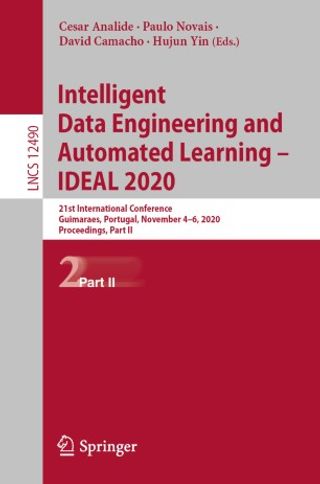?
Intelligent Data Engineering and Automated Learning – IDEAL 2020/ 21st International Conference, Guimaraes, Portugal, November 4–6, 2020, Proceedings, Part II
Vol. 12490: Lecture Notes in Computer Science.
Кам :
Springer, 2020.
Под общей редакцией: C. Analide, P. Novais, D. Camacho, H. Yin
Главы книги
Миркин Б. Г., Фролов Д. С., Vlasov A. и др., , in: Intelligent Data Engineering and Automated Learning – IDEAL 2020/ 21st International Conference, Guimaraes, Portugal, November 4–6, 2020, Proceedings, Part IIVol. 12490: Lecture Notes in Computer Science.: Cham: Springer, 2020. P. 423–433.
Добавлено: 13 ноября 2020 г.
Шалилех С., Миркин Б. Г., , in: Intelligent Data Engineering and Automated Learning – IDEAL 2020/ 21st International Conference, Guimaraes, Portugal, November 4–6, 2020, Proceedings, Part IIVol. 12490: Lecture Notes in Computer Science.: Cham: Springer, 2020. P. 413–422.
Добавлено: 14 ноября 2020 г.
Язык:
английский

Semenikhin n., Корнилов М. В., Lavrukhina A. и др., Communications in Computer and Information Science 2026 Vol. 2641 P. 211–219
Добавлено: 12 февраля 2026 г.
Канаев Е. А., Вьетнамские исследования 2025 № 4 С. 47–59
В статье предпринята попытка определить потенциал вьетнамских стартапов, использующих в своей деятельности инструменты искусственного интеллекта (ИИ), для стимулирования многостороннего экономического со трудничества в ЮгоВосточной Азии. Систематизированы направления цифро вой поддержки для развития многосторонних проектов и инициатив в рамках Ассоциация стран ЮгоВосточной Азии (АСЕАН); дана оценка процессу инте грации в них стартапов, в том числе использующих ...
Добавлено: 30 января 2026 г.
Сорокин К. С., Бекетов М. Е., Онучин А. и др., / arxiv.org. Серия cs.SI "Social and Information Networks ". 2025.
Обнаружение сообществ в сложных сетях — фундаментальная проблема, открытая для новых подходов в различных научных областях. Мы представляем новый метод обнаружения сообществ, основанный на потоке Риччи на графах. Наша техника итеративно обновляет веса ребер (их метрические длины) в соответствии с их (комбинаторной) версией кривизны Риччи Фостера, вычисленной на основе эффективного расстояния сопротивления между узлами. Известно, ...
Добавлено: 15 января 2026 г.
Шапошников С. В., В кн.: Восьмая международная конференция «Управление бизнесом в цифровой экономике»: сборник статей конференции, Санкт-Петербург.: СПб.: ИПЦ СПбГУПТД, 2025. С. 109–112.
Малые и средние предприятия (МСП) составляют 99,7 % компаний Японии и обеспечивают занятость
70 % рабочей силы. Однако они сталкиваются с нехваткой кадров, финансовыми ограничениями и сложностями внедрения инноваций. Искусственный интеллект (ИИ), особенно генеративный ИИ, может стать
решением этих проблем, но его внедрение в МСП остается низким (5,6 %) по сравнению с развитыми
странами (75 %). Основные барьеры- ...
Добавлено: 12 января 2026 г.
Гаянов Н. В., Парусникова А. В., / Cornell University. Серия math "arxiv.org". 2025.
Рассматривается алгебраическое q-разностное уравнение. Предлагается достаточное условие существования формального степенно- логарифмического разложения решения такого уравнения в окрест- ности нуля. Приводится пример применения этого достаточного условия для построения формального разложения решения неко- торого q-разностного аналога пятого уравнения Пенлеве при конкретных значениях параметров уравнения; рассматриваются два различных значения числа q, приводящие к качественно разным формальным асимптотическим разложениям ...
Добавлено: 25 декабря 2025 г.
Петрованов И. С., Сергеев А. В., / Series Computer Science "arxiv.org". 2025. No. 2512.18332.
Добавлено: 24 декабря 2025 г.
Arinin O. V., Bakhmach D. M., Кацнельсон А. И. и др., , in: 2025 Systems of Signals Generating and Processing in the Field of on Board Communications.: IEEE, 2025. P. 1–5.
Добавлено: 6 декабря 2025 г.
Гнетов Ф. А., Конаков В. Д., / Series arXiv "math". 2025. No. 2512.04667.
Добавлено: 5 декабря 2025 г.
Добавлено: 4 декабря 2025 г.
Биттер И. И., Конаков В. Д., / Cornell University. Серия arXiv "math". 2025. № 2505.24548.
В работе приводится обобщение локальной предельной теоремы о сходимости неоднородных цепей Маркова к диффузионному пределу на случай, когда соответ- ствующие коэффициенты процессов удовлетворяют слабым условиям регулярности и совпадают лишь асимптотически. В частности, рассматриваемые нами коэффици- енты сноса могут быть неограниченными с не более чем линейным ростом, а оценки отражают перенос терминального состояния неограниченным трендом через ...
Добавлено: 3 декабря 2025 г.
Hessian-based lightweight neural network for brain vessel segmentation on a minimal training dataset
Меньшиков И. А., Бернадотт А. К., Елфимов Н. С., / Series arXie "Statistical mechanics". 2025.
Добавлено: 1 декабря 2025 г.
Добавлено: 1 декабря 2025 г.
Индаков Г. С., Казначеев П. А., Майбук З. Я. и др., Геофизические исследования 2025 Т. 26 № 2 С. 99–124
Исследована группируемость импульсов акустической эмиссии при высокотемпературном нагреве образца песчаника, предварительно подвергнутого механическому нагружению. Механическое нагружение осуществлялось в одноосном режиме до нагрузки, близкой к разрушающей, с проявлением на поверхности признаков крупных трещин. После этого образец нагревался до 650 °C с регистрацией импульсов термоакустической эмиссии (ТАЭ). Проведена кластеризация импульсов на основе их сходства, установленного методом взаимной ...
Добавлено: 19 сентября 2025 г.
Чепиков И. А., Карпов И. А., , in: 26th International Conference, AIED 2025, Palermo, Italy, July 22–26, 2025, Proceedings, Part I. Artificial Intelligence in Education. Posters and Late Breaking Results, Workshops and Tutorials, Industry and Innovation Tracks, Practitioners, Doctoral Consortium, Blue Sky, and WideAIED.: Springer, 2025. P. 352 – 358.
Добавлено: 4 сентября 2025 г.
Wien: Association for Computational Linguistics, 2025.
Добавлено: 26 августа 2025 г.
Delev A., Semakov S., , in: 2025 8th International Conference on Artificial Intelligence and Big Data (ICAIBD).: IEEE, 2025. P. 318–322.
Добавлено: 25 августа 2025 г.
В издании представлены основные положения по организации мониторинга разработки и применения технологий искусственного интеллекта. Приводятся концептуальная модель мониторинга, понятийный аппарат, классификация технологий искусственного интеллекта и типология связанных с ними товаров и услуг, система показателей и детальное описание методических подходов к их расчету, источники данных.
Публикация предназначена для профильных органов государственного управления и статистики, компаний, вузов и ...
Добавлено: 9 июня 2025 г.